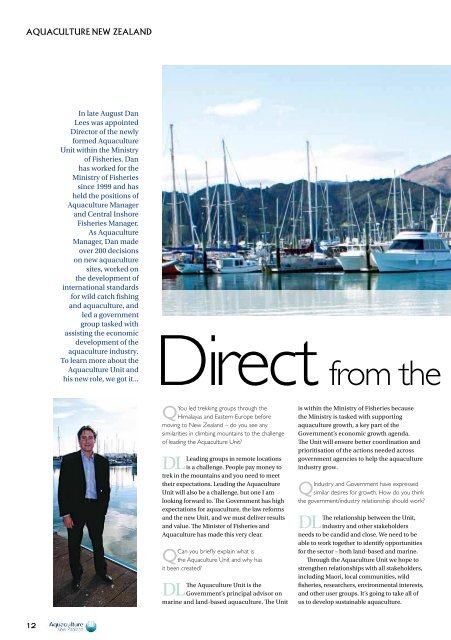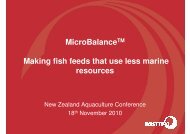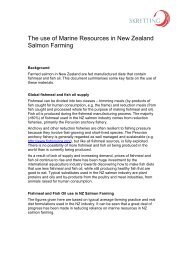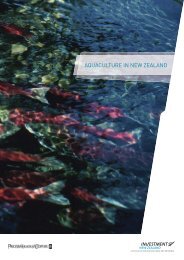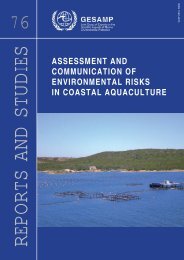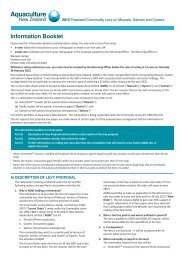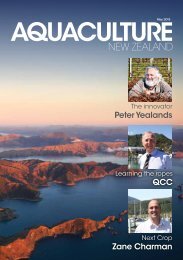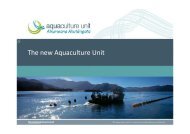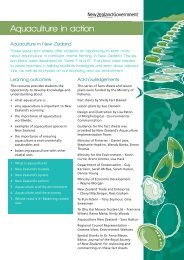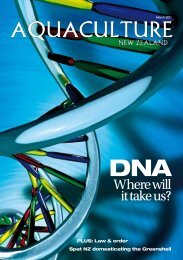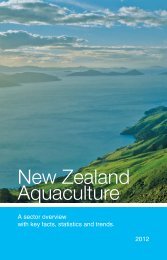November, 2010 - Aquaculture New Zealand
November, 2010 - Aquaculture New Zealand
November, 2010 - Aquaculture New Zealand
- No tags were found...
You also want an ePaper? Increase the reach of your titles
YUMPU automatically turns print PDFs into web optimized ePapers that Google loves.
In late August DanLees was appointedDirector of the newlyformed <strong>Aquaculture</strong>Unit within the Ministryof Fisheries. Danhas worked for theMinistry of Fisheriessince 1999 and hasheld the positions of<strong>Aquaculture</strong> Managerand Central InshoreFisheries Manager.As <strong>Aquaculture</strong>Manager, Dan madeover 200 decisionson new aquaculturesites, worked onthe development ofinternational standardsfor wild catch fishingand aquaculture, andled a governmentgroup tasked withassisting the economicdevelopment of theaquaculture industry.To learn more about the<strong>Aquaculture</strong> Unit andhis new role, we got it...Direct Directorfrom theQ QYou led trekking groups through theWill the <strong>Aquaculture</strong> Unit haveHimalayas and Eastern Europe beforeany special powers?moving to <strong>New</strong> <strong>Zealand</strong> – do you see anysimilarities in climbing mountains to the challengeof leading the <strong>Aquaculture</strong> Unit?Leading groups in remote locationsDL is a challenge. People pay money totrek in the mountains and you need to meettheir expectations. Leading the <strong>Aquaculture</strong>Unit will also be a challenge, but one I amlooking forward to. The Government has highexpectations for aquaculture, the law reformsand the new Unit, and we must deliver resultsand value. The Minister of Fisheries and<strong>Aquaculture</strong> has made this very clear.QCan you briefly explain what isthe <strong>Aquaculture</strong> Unit and why hasit been created?The <strong>Aquaculture</strong> Unit is theDL Government’s principal advisor onmarine and land-based aquaculture. The Unitis within the Ministry of Fisheries becausethe Ministry is tasked with supportingaquaculture growth, a key part of theGovernment’s economic growth agenda.The Unit will ensure better coordination andprioritisation of the actions needed acrossgovernment agencies to help the aquacultureindustry grow.QIndustry and Government have expressedsimilar desires for growth. How do you thinkthe government/industry relationship should work?The relationship between the Unit,DL industry and other stakeholdersneeds to be candid and close. We need to beable to work together to identify opportunitiesfor the sector – both land-based and marine.Through the <strong>Aquaculture</strong> Unit we hope tostrengthen relationships with all stakeholders,including Maori, local communities, wildfisheries, researchers, environmental interests,and other user groups. It’s going to take all ofus to develop sustainable aquaculture.The Unit does not have any specialDL powers. The draft Bill, however, willcontain a provision that allows the Ministerresponsible for aquaculture to amend regionalcoastal plans through regulation. The new Unitwill provide advice to the Minister around useof this power, including whether consultationrequirements have been met. The Minister willnot approve individual resource consents –that will remain the job of the relevant council.QWhat are the priorities of the<strong>Aquaculture</strong> Unit?The <strong>Aquaculture</strong> Unit has threeDL priorities for the next year:• Lead implementation of the new law.• Complete the <strong>Aquaculture</strong> Strategy andAction Plan, and start delivering results.• Coordination between the groupsinvolved in aquaculture.Dan Lees – Director, <strong>Aquaculture</strong> UnitQHow will these improve orchange the industry?The proposed new law will reduceDL regulatory burdens for industryand increase certainty for all stakeholders– local communities, industry, Maori, andenvironmental interests. We need to makesure the new law is implemented properlyand understood by users to ensure thebenefits are realised.The Strategy and Action Plan will clearlyidentify how government will work withstakeholders to develop aquaculture. Thestrategy will cover projects to developnew space and species, and will also lookbroadly into research and innovation,market development, and iwi participation.The strategy will look across governmentportfolios at the actions needed to developsustainable aquaculture.Coordination and strong relationships willbe essential to success. Many governmentagencies’ work affects aquaculture and weneed to ensure we are all singing the samesong. We also need to work alongside AQNZ todevelop the necessary partnerships with localgovernment, iwi, and with other stakeholders.QRegulatory road blocks have been amajor hurdle for the industry over thepast decade, how do you plan to combat this?The proposed new law simplifiesDL the regulations governing marineaquaculture while a review of the land-basedaquaculture regime will begin in 2011.QWill the Unit have any effect over the dailyoperations on the water?Yes. In future we hope to see moreDL new farms, a widening diversity ofspecies grown around the coast, and morepeople employed in the sector.QWhat do you believe you need toachieve to be successful in this role?There are a number of things I willDL need to achieve:• Provide a clear direction for the<strong>Aquaculture</strong> Unit• Lead and ensure coordination acrossgovernment agencies• Work with industry and other stakeholdersto ensure the <strong>Aquaculture</strong> Strategy andAction Plan is achievable, practical andmakes commercial sense• Build and maintain the numerousrelationships needed to support aquaculture• Ensure Ministers are informed and advisedon aquaculture matters.QWhat will be yourmain challenge?There are challenges to us all inDL developing aquaculture in <strong>New</strong><strong>Zealand</strong>, and good things do not always comeeasily. One main challenge I have set for myselfand for the Unit is about building relationshipswith our stakeholders – from marine farmersto researchers to coastal planners. The successof a project is often based on the relationshipsyou build. The key is maintaining thoserelationships through the good and the bad.As a Unit, we will need to be able to returnanother day with another project.Another challenge is managingexpectations on what aquaculture candeliver. There are economic opportunitiesin aquaculture, but as people in the industryknow it is not easy money. Overall we needto make sure aquaculture development issustainable and encourage new entrants topresent a good business case. •12 N o v e m b e r 2 0 1 0 13


